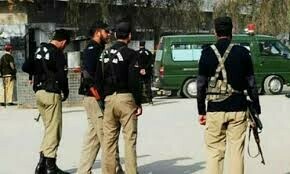 |
SAHIWAL: Historian Dr Mubarak Ali says large metropolises are behind the brain drain of intellectual, literary and cultural resources of small cities, making them vulnerable as most of their talent moves from the native places to big metropolitan centres which have more opportunities as compared to small cities.
He was addressing launch of “Tareekh-i-Sahiwal; Qadeem Aur Jadeed Ki Roshni Mein” at the Sahiwal Arts Council.
The 670-page book is written by M.A. Ashraf (late) and published by the Punjab Lok Sujag.
Dr Mubarak praised the author, a GPO employee, for the encyclopedic work on Sahiwal’s history. He said M. A. Ashraf must be appreciated because he lived in the city (Sahiwal) and wrote its history within a span of 12 years. He said it’s an irony that lack of opportunities in small cities were compelling intellectuals, poets and writers to migrate to big metropolitan centres which were making small cities culturally and intellectually poorer.
“Their contribution to society and cultural development of small cities goes to waste as they prefer to move to Lahore, Karachi and other big centres,” he said, terming the phenomenon a sort of intellectual brain drain.
MA Ashraf’s Tareekh-i-Sahiwal launched
Dr Mehdi Hasan, commenting on the book, said tracing cultural and historical roots to the Middle East and Arab culture was common with our historians since the last one thousand years.
“But M. A. Ashraf’s book is unique because it traced its roots to Harappa and Indus Civilisation,” he said, having sense of history from peoples’ perspective and not from the invaders’ perspective.
Dr Mehdi said that until we taught history from our own native cultural perspective the menace of fanaticism and extremism could not be tackled. He said it’s our duty as a nation to teach our generation the actual history of our land.
“M. A. Ashraf was somebody who knew this difference,” he said, adding Ashraf should be given credit for not damaging history by linking it to ‘foreign lands’ but to the people of this land.
Archaeologist and rights activist Dr Rafiq Mughal said no civilised nation could afford ignoring its 5,000 years old heritage but that had been done here by ignoring Harappa. He said Ashraf’s book thoroughly expressed what “connection people of this land have with the world’s oldest civilisation”.
It is learnt M.A. Ashraf (1948-2011) had written 700 pages with his own hand but he could not get them published because of poverty. The unpublished book remained with many individuals, including his family members, but none dared to get it published. Later, his family was approached by the Punjab Lok Sujag that published it in greater public interest.
“We saved a gigantic work done by a man having small resources. This is now history and people will add to it further,” said Tauqeer Mustafa, executive director of Lok Sujag.
The event was also addressed by provincial minister Malik Nadeem Kamran, Government Postgraduate College Sahiwal Principal Ikhlaq Ahmed and the family of M.A. Ashraf. The book ceremony was jointly organised by Lok Sujag, Sahiwal Art Council, Majeed Amjad Academy, Awaz Society, and Lok Rahs.
Published in Dawn, April 28th, 2015
On a mobile phone? Get the Dawn Mobile App: Apple Store | Google Play













































Dear visitor, the comments section is undergoing an overhaul and will return soon.